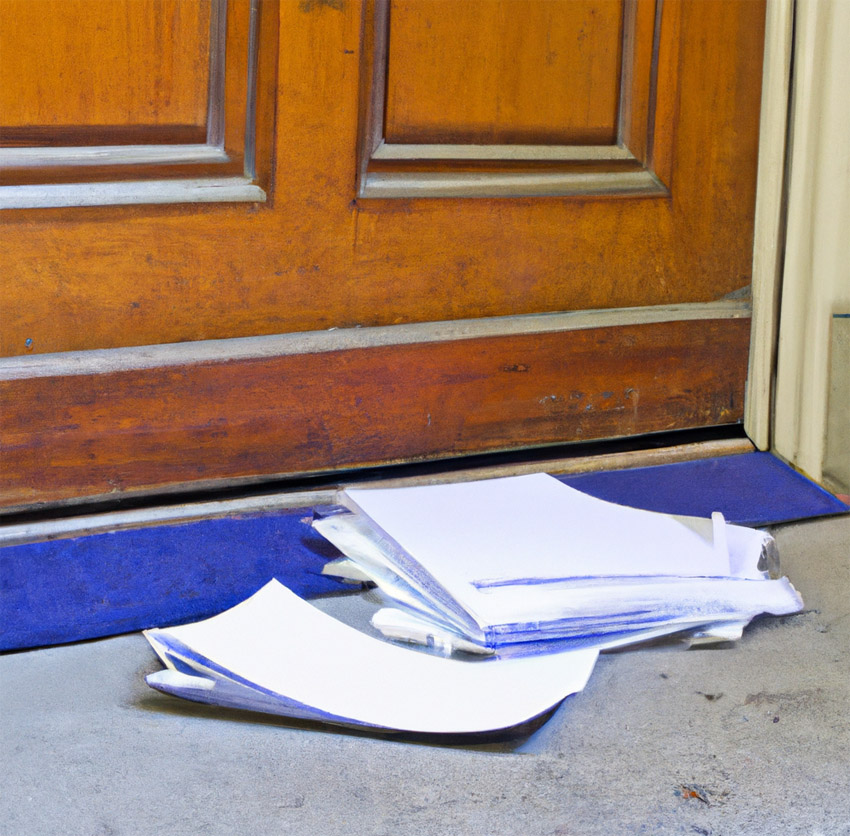If you want to sue somebody or perform other legal directives, such as divorcing a person or obtaining child support, you may need to have legal documents served to them.
However, individuals who are aware you are trying to serve them may try to avoid accepting legal papers. Defendants may assume they can dodge a court case if they refuse to receive service, but this is not the case.
When a respondent is hard to find, you may feel unnecessarily stressed because legal proceedings get dragged out for no good reason. It’s critical to understand the lawful way to approach this situation and deliver legal papers as quickly as possible.
Process servers can be engaged to find an elusive defendant and lawfully deliver the documents. But what happens when a process server cannot track down the offender, or if they are intentionally hiding?
Read on to find out how to serve someone who is avoiding service in California and how to move forward in the easiest and most stress-free way possible.
Why Do People Avoid Service?
There are a number of reasons why a person may avoid accepting service. In some cases, the individual may be unaware that there is a lawsuit against them, or they may believe that the lawsuit against them is ridiculous. In other cases, the defendant may be trying to avoid the confrontation involved with being served.
Another common reason defendants avoid service is that they want to delay the matter at hand or make things particularly difficult for the person who has filed a case against them.
Offenders will often be in an emotionally charged state if they have been accused of having done something wrong, conducting a misdemeanor, or if they are about to lose something they care about. This position can cause them to act irrationally.
How Might a Person Avoid Being Served?
There are many tactics people will employ to get out of being served. A person may flatly refuse to acknowledge you, not answer their door, or steer clear of places where they can usually be found. They could move out of state or completely change their appearance so you can’t recognize them.
This behavior is called evasion of service, and it is perfectly legal. But it does not mean action will not proceed. The courts will not dismiss the case simply because somebody doesn’t want to be sued.
If a process server can prove they have made reasonable efforts to serve process but have been unable to do so, a judge can enforce additional options. Some process servers use non-traditional methods to make sure the person is aware of pending legal action against him or her.
How Process Servers Can Help
When you file a summons or complaint against somebody, usually the situation has arisen from a position of adversity, causing stress and uncertainty.
An offender who tries to refuse service creates undue pressure and delays. You may be unable to focus on your work or lose sleep trying to figure out how to deliver service so you can progress through the courts and move on with your life as quickly as possible.
Under these circumstances, it’s usually easier to hand matters over to the experts. Professional process servers are familiar with the procedures involved in the serving process, as well as the laws surrounding what you can and can’t do when you’re serving legal papers in California.
They can also retrieve legal documents from the courts on your behalf.
D&R Legal are process servers in California with over 37 years of experience in the field. They know all of the particulars of the California legal system and will take the hassle away from having to serve the papers yourself.
If you need help serving papers to an avoidant defendant, get in touch with D&R Legal today.
What Happens When Someone is Trying to Avoid Service?
A citizen’s right to due process means that they must be informed of any legal proceedings that involve them and be served a copy of the complaint notifying them that there is a lawsuit pending, before they can be taken to court. Some defendants try to take advantage of this and flee, hide, or become difficult to find if they suspect somebody may be trying to serve them.
When an individual refuses to be served quickly, it makes the process more challenging for the individual who has filed legal action against them.
If the defendant tries to evade service by staying away from their home, you can serve them at their workplace or another public place. If that does not work, you may need to locate another address to serve them at.
You might also enjoy these recommendations: San Francisco Process Server
What Can You Do When Someone is Trying to Evade Service?
If someone is trying to avoid service, you have other options. Here are a few ways service of process may be rendered to a difficult party.
Service of Process by Mail
Instead of personally delivering legal papers, a process server may convey service by certified mail in California. If the server can track down the last known address, or forwarding address of the defendant, the complaint and court summons may be sent by certified mail to this address. This requires a competent person over the age of 18 to sign for the papers upon delivery.
Substitute Service of Process
Substituted service of process usually results after several failed attempts to personally serve process to the named defendant in a lawsuit. This technique allows the process server to leave the subservable documents with someone over the age of 18, such as a co-resident in the defendant’s home, a business manager, or a person apparently in charge at the subject’s workplace or Usual Place of Mailing. Not a United States Post Office Box, but a Commercial Mail Receiving Agency (CMRA) like, The UPS Store will work.
Substitute services of process make it pointless to avoid being served if the process server knows the address of your home, workplace or usual place of mailing. You may be eventually served through substituted service.
Drop Service
Your process server may perform an act called “drop service” to someone who is avoiding service or confrontational. Papers can be left on the ground in front of the person being served or placed under the car’s windshield wiper while the subject is in the vehicle.
Drop service is not permitted in every state. In California, most courts deem this an appropriate delivery method. However, there are a few specific ways in which it must be performed:
- For personal service you must identify the person being served; through self admission, someone else identifies the person to you, description and or pictures.
- For substitute service you need to confirm that the address is a Usual Place of Home, Work or Mail and that the person you’re leaving the documents with is 18+ and lives or works there with the subject. (Getting their Name is NOT Required).
- You have to be within “Easy Speaking Distance.”
- Tell them that you have legal papers for them or the subject.
- Leave the Documents in an easily found place, usually at their feet.
The server then leaves the premises, and must under no conditions take the papers back.
Service by Special Court Order
In California and many other states for that fact, the court may allow you to serve the evading party by another means, something other than what is typical for a given service document. You can request a special court order from the judge to allow service by an alternative means, that is likely to give actual notice to the other party.
Let’s say you have a Personal Only document that is now allowed to be served by substitute service or posting and mailing. A subservable document that is now allowed to be posted and mailed.
If you can convince the judge that you have done everything possible to try to get the subject served through traditional methods and this specific way of serving the party, you propose is likely to give them actual notice they would be allowed to grant that order and let you move forward with your case.
Examples of California’s Service of Process by Special Court Order laws are:
- Service by Publication (CCP 415.50) is a form or service by special court order.
- Service of Unlawful Detainer Actions by Posting and Mailing (CCP 415.45) is a special court order that has been built into the code section because it happens all the time.
- Service of Corporation by serving the California Secretary of State (Corp. Code 2111)(Corp. Code 1702).
- Service of a Summons by Special Court Order (CCP 413.30).
- Service of a Domestic Violence Restraining Order (FAM 6340) by an alternative means.
Service of a Civil Harassment Restraining Order (CCP 527.6(m)(2)) by an alternative means.
Service of Process by Publication
Process service may also be rendered by publication (CCP 415.50). The courts must grant permission for this technique to be undertaken.
A notice of the pending lawsuit against the named defendant may be published and circulated for a certain period of time. Publications can also be entered in local newspapers and local printings.
The above methods are all ways that process servers will deliver legal process to the designated parties who have chosen to be evasive in attempts to avoid legal action that has been filed against them.
D&R Legal are qualified and experienced process servers who will serve any process or any legal document anywhere across the state of California. If you need help serving an evasive party, contact us today.
What Laws Apply to Serving Someone Who is Avoiding Service in California?
The California code of civil procedure is the document that outlines the legal framework that process servers are bound by. If legal service is not carried out under this code, delivery of service can be dismissed as invalid, and the person will not be considered legally served.
Here are some of the laws regarding process service in California. It should be noted that this is not an exhaustive legal guide, and you should consult with an attorney to better understand these laws.
California Registered Process Servers Have a Limited Exemption to Trespass Law
Generally a California Process Server has no greater authority to enter the property than any member of the general public, however, the purpose of the visit does. Serving of Process gives a legal process server a privilege, distinguished from a right, to enter the property for the purpose of delivering the legal papers. The law requires the service be made by delivery, and the process server gives notice to the opposing party through that delivery. Allowing the court to exercise its jurisdiction over the party.
A California Registered Process Server has a Limited Exemption to Vehicle Trespass Penal Code 602.(n) allowing one to drive a vehicle onto the property, allowing them to go to and from the front door to attempt service.
A Registered Process Server also has an exemption (Penal Code 602.8(c)(3)) from trespass for entering a property with a “No Trespassing” sign.
These exemptions do not allow a Registered Process Server to hop a fence, locked gate or wait around on the private property if told to leave.
Access to Gated and Guarded Communities is allowed to California Registered Process Servers through CCP 415.21
Service May be Delivered to Competent Persons Over the Age of 18
If a copy of the legal papers cannot be delivered to the named defendant, a summons may be served by leaving a copy of the complaint with a competent person in the household, or place of work or business – even if they are not a party to the action. This person must be older than 18 years and clearly informed of the contents. Then, the summons must be sent by first-class mail to the address where it was left, and delivery of service is considered complete on the 10th day after mailing.
Process Must be Served Within a Time Frame
A summons or complaint must be served within three years after the action has commenced against the defendant. Action is considered to have commenced once the complaint has been filed against the defendant. Proof of service must be filed within 60 days of the summons or complaint being delivered.
If a person has not been served within the set time frame, it is possible to apply for an extension with the courts, though it would be handy to have a competent lawyer at your side when you go through this process.
Every legal document will have it’s own service requirements and timeframes, your professional process server should be able to tell you these service dates, for most common forms.
Frequently Asked Question
How do you Serve Someone Who Won’t Answer the Door?
When someone refuses to open the door of their home to be served, there are several ways to deliver process. You could try their workplace, see if their car is at the household of friends and family, or places where they usually hang out.
There is a substitute service where you leave the legal papers with someone over the age of 18, and finally, with special court permission, you can serve process via local publication or Special Court Order.
Usually it just comes down to catching the person coming or going from their home or work address, requiring a few hours of stakeout time. Your process server will be able to suggest best times and if this is even possible at the subject’s location depending on the situation.
What happens if I can’t serve someone?
It can be tricky to serve papers. In California, evasive techniques do not necessarily mean the case will be dismissed in court. If you are having trouble finding someone, get in touch with an experienced professional process server who knows how to handle alternative and even non-traditional methods of process service.
Professional and experienced process servers such as D&R Legal are proficient at finding people who avoid service, even when it takes several attempts.
Is Avoiding Service Illegal?
No. Attempting to avoid service is called evasion of service, and it’s completely legal to do. That said, it’s rarely advantageous for the defendant to try. Running away from service can incur additional expenses and fees for the avoidant party, for example, multiple service charges, investigation fees and stakeout charges. These fees are the defendant’s responsibility, and the courts will not give up on the case. The lawsuit, along with the additional expenses, will eventually catch up to the evasive party.
How do you Serve Someone Without a Mailing Address?
With modern technology, there are many ways to track down a person and serve them. If you don’t know where they live, you can try to serve them at their workplace, or other locations such as restaurants, gyms, or shopping malls that they frequent.
It’s possible to track people down using non-traditional methods such as social media or contacting friends and family of the named defendant. It’s even an option to pay for a person search or search property records to secure a last known address for the person you want to serve.
Conclusion
Many people believe that if they try to avoid service, they will escape accountability from the legal action filed against them. This is not true.
In California, if somebody refuses service, it simply drags out the legal process and causes unnecessary stress and worry.
If you need to know how to serve someone who is avoiding service, the simplest solution is to hire a professional process server who knows the legal framework of process service and who can track down the defendant.
Don’t let the stress of an evasive litigant drag out your legal proceedings for longer than they need to. Working with professional process servers like D&R Legal can help you get papers served right away so that you can move past your court case as quickly as possible.
If you need help finding someone and serving papers to evasive parties, contact D&R Legal today to get the person served fast. or call us today to discuss your specific needs at 1-510-797-9996.
You might also enjoy these related recommendations: Fremont Process Server












What are your fees? in fresno county
Might be best to give me a call so we can go over your specific service.
https://drlegalprocess.com/process-serving/
I’m attempting to serve someone who is trying to avoid service. They have an apartment for rent but don’t live there. Is it legal to make an appointment to meet them there to serve them?
Likely Not Illegal, but there could be some liability issues regarding their time and money they could have been makiing with a actual customer. We personally don’t set appointments under false pretenses but have no problem showing up at the same time as someone elses set appointment.
We have a family member who has a court case and they can’t find the notary who basically did something illegally. They ran off and can’t be found!! What can you suggest how they find them?
Hire a Private Investigator who specializes in locating people.